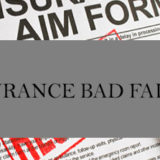Insurance Bad Faith
Insurance policies are sold on the basis they pay claims for an unanticipated event that results in a loss. This can include claims arising from damage to property and under disability and life insurance policies. When something goes wrong resulting in a claim, the insurance policy sets out the terms of coverage. If covered, the insured is compensated for the loss. While this process can go very smoothly without problems, sometimes insurance companies take the position your claim is not covered and deny coverage for the claim. Not only can that decision can be wrong and unfair, it can result in significant financial loss.
If you have a claim you think should be covered under your insurance policy and coverage has been denied, or if the insurance company has been patently unfair in the way they have dealt with your claim, you may have a bad faith claim against your insurer. A bad faith case potentially arises when your claim is denied without a reasonable investigation or grounds or the insurer in handling the claim has treated you unfairly. In those situations the insurer may be found to have not dealt with you or your claim in good faith.
What is Insurance Bad Faith?
The legal term “insurance bad faith” originated in the United States, but there are cases in Canada which have awarded damages for bad faith as well. At its most basic, it means that an insurance company is guilty or believed to be guilty of acts contrary to the duty it owes to its insured to deal with their claim in good faith and the insured is entitled to damages as a result. Insurance companies are expected, and bound by law, to provide fair dealing and good faith to the people they insure.
If an insurance company violates their good faith obligations, a claim against the insurance company for coverage under the policy will usually include a claim for damages for bad faith. If awarded, damages for bad faith are over and above the value of the original claim under the policy.
How to Tell if an Insurance Company Acts in Bad Faith
In order to file a claim against an insurance company for bad faith, the insured must have evidence or proof that there were actions taken by the insurance company which violated the terms of the policy and its duty to deal with their claim in good faith. This includes unjustified denials of coverage and not dealing with covered claims ethically – for example delaying payment of a claim or only being prepared to pay a fraction of what the honest value of the claim. The bad faith conduct of the insurer must be of some significance to warrant a claim– it is not enough that you were treated unfairly in regards to a minor aspect of your claim.
There is no uniform standard for identifying insurance bad faith as it depends on the facts of each case. However, if you as an insured believe that you have been wrongfully denied a claim or were treated unfairly by an insurance company, it is wise to consult a lawyer with insurance experience.
How can an Insurance Bad Faith Lawyer Help?
Since the law surrounding bad faith can be difficult to apply to the facts of a claim, it is best to consult an insurance bad faith lawyer who knows the law and can represent you and ensure your rights are protected and you recover what you are entitled to under your insurance policy. The lawyer will meet with you, review with you the insurance policy and facts relating to your claim and provide advice as whether you have a case and how best to proceed to resolve the matter.
When a person is denied a claim for insurance coverage or it is limited, they should not accept it without first determining whether the insurance company’s decision has a correct legal basis. Too many people just shrug their shoulders and walk away without getting legal advice as to whether they have a valid claim. This is how insurance companies can get away with unethical practices when they occur. Most insurance companies act in good faith on most claims, but there are those that don’t.
If you have an insurance claim that has been denied or not resolved fairly, don’t just accept the insurance company’s decision, bring it to us for advice. There may be an error and you may be entitled to coverage and damages for bad faith.
For further information regarding bad faith see:
Roderick S.W. Winsor, Good Faith In Canadian Insurance Law, (Toronto: Canada Law Book, 2007 looseleaf service)
Gordon H. Hilliker Q.C., Insurance Bad Faith, 3d Ed. (Markham: LexisNexis Canada, 2015).
Whiten v. Pilot Insurance Co., 2002 SCC 18
Fidler v. Sun Life Assurance Co. of Canada, 2006 SCC 30, [2006] 2 S.C.R. 3




